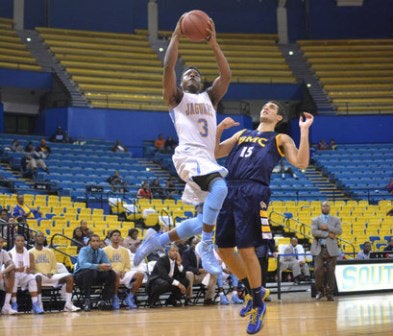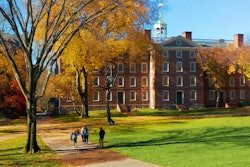
Southern’s men’s basketball team, along with the university’s other 15 Division I teams, still is operating under an NCAA postseason ban imposed in October 2012 due to Academic Progress Rates and Graduation Success Rates discrepancies, which could date back as far as 2008. Southern University Athletic Director William Broussard says the 350-plus student athletes are not to blame; instead, he attributes the NCAA ban to inadequate recordkeeping primarily by the university’s registrar’s office.
“We’re now reconstructing history,” Broussard said. “You’re piecing together all of the parts that have been used to determine eligibility. Rosters [and] squad lists, in many instances, haven’t been stored properly, and then you have to rely on other institutions or re-create the history manually.
“I’ve spent a lot of time looking at stats that happened during competitions and reported from competitions to try and reconstruct squad lists and rosters that we didn’t have on file or in the past that were incorrectly reported to the NCAA,” Broussard continued. “And then I’ve been trying to put together student athletes’ transcript histories that may not have all of the original transcripts of transfer students, so it’s a lengthy process because you have to contact the institution from which the student transferred.”
For Southern, a team that broke conference and NCAA records throughout the 2013-14 season, very little provides solace for what could have been a promising postseason that fell short. Southern coach Roman Banks led his Jaguars to the NCAA tournament last season and said he didn’t expect not to go back. He was named SWAC Coach of the Year, and two of his players, Calvin Godfrey and Tre’Lun Banks, were named newcomer and freshman of the year, respectively. To not play in the tournament because of skill was one thing, Banks said, but he didn’t foresee any academic roadblocks, especially after getting APR scores up to prevent a ban during the 2012-13 season, when the Jaguars won the conference title.
“Well, you know there have been a couple of situations and we did a pretty good job bouncing through it, especially being able to come to the tournament last year after getting our APR scores up,” Banks said. “Then all of a sudden, I learn about another issue regarding institutional control that happened before I got here, but [it] affects us right now, and, at the end of the day, it just wears on you … and I think this mess has just taken away some of their [the players] chances.”
Southern and three other institutions would not have been given a chance to play in the basketball tournament or any of the conference’s sports tournament had it not been for the SWAC Council of Presidents and Chancellors voting to allow them to play. The topic of allowing the teams to play was nothing new for the 10-school conference council. Both Broussard and Southern University Chancellor James Llorens said a few of the schools had been pushing for a couple of years to change the terms of NCAA postseason bans that applied to the SWAC. The council voted 7-3 to allow Southern, University of Arkansas-Pine Bluff, Grambling State University and Mississippi Valley State University—all of which were banned because of APR issues—to participate in postseason conference play.
“It [the postseason conference ban] wasn’t required by the NCAA,” Llorens said. “It was strictly a conference policy, and we felt that it was removing a lot of incentive from our schools. It has nothing to do with downplaying or not understanding the seriousness of academics.
“But we understand that our conference is a very low-resourced conference in terms of the number of institutions that, for various reasons, may be ineligible in the postseason,” added Llorens. “I think our conference has to take more responsibility for providing resources to our institutions to prepare for those types of extensive audits and we shouldn’t be punishing our players. For most of our players, the conference championship is the ultimate for them. It’s the pinnacle. So why should we take that away from them?” SWAC Commissioner Duer Sharp was not available for comment about the vote after multiple requests. Alabama A&M University, Alabama State University and Jackson State University were the three schools that voted against the mandate change.
“Our compliance officer is a 25-year former federal employee who’s very diligent to make sure our people do what they need to do,” said Kevin Rolle, executive vice president and chief operating officer at Alabama A&M. “Also, we have academic counselors, and we put forth the resources to ensure students and faculty are given what they need to be successful.
“It was our president’s thought that if one, two, three or four schools in the SWAC couldn’t do what they needed to do to get to the next level academically, then the SWAC needed to do the same thing athletically,” Rolle added. “I’m not blaming the conference because the SWAC did what the presidents and chancellors wanted. They took a vote and now we’re here.”
Broussard said turnover and fiscal issues have plagued schools in the SWAC. He said many of the presidents and chancellors understand that they’re inheriting situations on their campuses and trying to modernize operations, trying to grow their staffs and trying to do more things efficiently and electronically. He said in the process of all of that, they get caught in the reviews where quality control is called into question and, all of the sudden, schools are serving an APR postseason ban.
“Look at all of the turnovers we’ve had,” noted Broussard. “We’ve had four chancellors, around four system presidents in that period of time. We’ve probably had six or seven registrars, four athletic directors, and God knows how many athletic staff members.”
Greg Lafleur, Southern’s athletic director from 2005 to 2011, said the institutional control issues are no surprise. He said Southern still was handling student athletes’ eligibility requirements on paper instead of NCAA-compliant software.
“I got there [Southern] and was like, ‘We are treading on thin ice by not having this because it was so difficult to keep records,’” he said. “It’s not so hard to keep records, but it’s hard to pull up records. I told them ‘Listen, we’re not going to be able to keep up with things that are going on until we get this software,’ and it took me three years to get Southern to get this compliance software.
“It wasn’t until 2009 that we got [the software], but it made [it] very easy to keep better records [of] student names, social security numbers and related things,” Lafleur explained. “Once you entered that information, it was all locked in and something that the NCAA could check. If they wanted to see some compliance information, all you had to do was hit a button and there it was.”
Southern now has weekly conference meetings with the NCAA. SU System President Ronald Mason said during a March 18 video chat that a better system of checks and balances is being implemented.
Broussard, Llorens and Mason agree that the school has been more transparent with the discrepancies and solutions. The school has hired a consultant who is experienced in compliance and auditing matters, and, despite the proverbial inquiries, the APR issue has not stopped fundraising because “supporters have understood this is a problem all three inherited,” said Mason.
“The records situation goes back several years and now it’s come home to roost,” he said. “We tell them the truth, which is there have been budget cuts and how our system needs to be fixed. Our issue with the NCAA is really a recordkeeping issue and one that centers on the registrars’ office.
“I believe that most people feel positive about the fact that we keep making progress,” Mason added. “And this is one of those things that came to a head before we had a chance to get to it.”


















